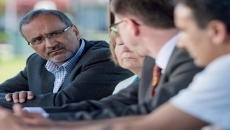Foreign aid groups are hailing the federal Liberal government's return to a policy of increasing humanitarian and development spending each year, while asking for a plan to push allies to reverse a global decline in aid.
"It was a good moment for Canada to step up and show global leadership by making this commitment of additional, new humanitarian money," said Kate Higgins, the head of Cooperation Canada, which represents more than 100 non-profits.
The Liberals pledged in their Tuesday budget to increase humanitarian aid by $150 million in the current fiscal year and $200 million the following year.
Global Affairs Canada says that means total foreign aid for this fiscal year "is projected to exceed $7 billion," though the department did not offer a precise number.
"When others are withdrawing, or talking about withdrawing from the world, we are doubling down on our engagement," International Development Minister Ahmed Hussen said Wednesday.
The Liberals faced persistent criticism a year ago from the aid sector when they earmarked $6.9 billion in funding for development and humanitarian needs, a 15 per cent decline from the previous year.
The Trudeau government has pledged to increase foreign aid ever year they're in office, but the Liberals said they made exceptional increases to aid spending to account for the COVID-19 pandemic and the war in Ukraine, eventually exceeding $8 billion.
The new humanitarian funding comes at what Higgins calls an unprecedented state of need and complexity, with major wars in the Gaza Strip, Ukraine and Sudan, along with conflict and mass migration crises in Myanmar, Nigeria and Venezuela.
Countries known for their aid spending such as the U.K. and France have cut back on foreign aid, citing pressures on their domestic economies. UNICEF Canada says nearly a quarter of the world's children are living in or fleeing from conflict zones.
Hussen said Canada's aid will continue to put a focus on supporting women and helping them create the conditions for peace.
"Our government believes and knows the value of international aid, and the results that it delivers all around the world, and right here at home. So Canada is shaping a world that is more peaceful, more prosperous, and more resilient," he said.
The budget also reaffirms Canada's pledges to push for the reform of multilateral financing institutions like the World Bank. The aim is to help poor countries escape debt traps and the financial burden of catastrophic natural disasters, moving instead toward being able to invest in infrastructure that's more resilient to climate change.
Higgins was glad to see that commitment reiterated, but stressed that Ottawa needs to be more transparent in how it reports its data, particularly since the budget did not outline the cumulative figure of foreign aid for this fiscal year.
On Tuesday, Cooperation Canada and other aid coalitions called on Ottawa to use its chairmanship of the G7 next year to push some of the most powerful countries on earth to get back to boosting foreign aid.
The G7 has countries like the U.S., Japan and Germany send ministers for meetings throughout the year in the host country, culminating in a leader's summit.
That means Ottawa can use its clout now to start pushing countries to boost their aid funding in 2025, and have the G7 pay more attention to crises beyond the Russian invasion of Ukraine, Higgins said.
"We will be pushing the government to really look at the breadth and scope of the humanitarian crisis around the world."
Hussen would not say whether Canada plans to push its G7 peers on aid, and instead lambasted the Conservatives for a "reckless" pledge in February to divert an unspecified amount of "wasteful" foreign aid toward military spending. The Tories did not respond to an interview request.
NDP foreign affairs critic Heather McPherson said the increase in humanitarian aid doesn't make up for cuts the Harper and Trudeau governments have made over recent years.
"We're not meeting the moment," McPherson said, considering famine-like conditions in Haiti, Sudan and Gaza.
She noted that Canada still isn't meeting the global target for rich countries, set out by former Prime Minister Lester Pearson as 0.7 per cent of gross national product for foreign aid. The Organization for Economic Co-operation and Development tabulates Canada's spending last year as half that target, at 0.38 per cent.
"The world needs Canada to be paying its fair share, and needs Canada to be playing a meaningful role," McPherson said.
She also argued it was "short-sighted" of the Liberals to boost military spending at a much higher rate than aid or diplomacy. The NDP supports more help for Ukraine's defence, but Canadian diplomats and aid workers could help undercut the factors that are driving crises worldwide, McPherson said.
"We've got such a strong, capable international development sector that could accomplish so much. We have such strong diplomats that could accomplish so much, if they were just given the tools."






